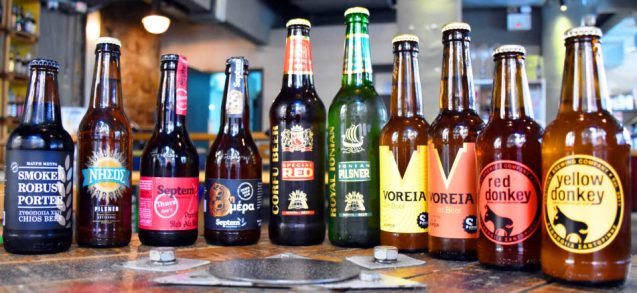Food and beverage manufacturing has traditionally been an area in which Greek companies excel. When it comes to beer, the Greek beer industry is taking one step ahead with the launching of Greek microbrewery brands. Consumers have welcomed these products from a fast-expanding market and have shown loyalty to brands, despite the challenge these local products face from imported beers. According to the Hellenic Association of Brewers, the brewery industry in Greece has a positive impact on the Greek economy with tax revenues generated by beer amounting to 640 million €.
20+ microbrewers operating in some of the most beautiful destinations in Greece
In recent years, microbreweries throughout Greece have been producing beers that come with their own Greek stamp of authenticity. From Argos, Messinia, Patras, Evia, Serres and Komotini to Crete, Santorini, Tinos, Chios, Corfu, Kefalonia, Rhodes and Piraeus, microbreweries are on the rise, creating distinctive, unpasteurized, unfiltered, aromatic beers, expanding production, raising new capital and trying to satisfy international demand as local interest in their beers also grows.
The competitive advantage of Greek microbreweries is the high quality of the tasty beers in unique recipes, achieved on account of the production of small quantities so as to enhance the flavour, the aromas and the nutritional value of the beer. They also produce organic beers using local honey and grains, just as they did thousands of years ago. Microbreweries apply environmentally-friendly processes which minimize the ecological impact and support the community through local employment practices, as well as the local economy by sourcing materials and services.
Greece produces and exports to a dozen countries superb beers of different varieties: Organic, premium, draft, craft, pilsner, blonde, brown, amber, black, with single or dual fermentation and the list goes on. Equally imaginative as the flavours are the designs of the bottles and their colourful labels, some of them designed by renowned Greek artists like Alekos Fassianos (Volkano beer). Many have won international awards and one of them (Nissos beer) has achieved the “Silver European Beer Star” at an international competition in Bavaria, Germany. SEPTEM — which has won international awards for its brews and has been ranked as the best Greek beer on RateBeer.com for the past four years — is planning to ramp up production. “The move will take the microbrewery from producing nearly 80,000 gallons of beer a year to up to 264,000 gallons. The crisis helped us make more careful moves, not investing in unrealistic production facilities for the times,” said Sofoklis Panayiotou of SEPTEΜ beers on Evia.
History of beer in Greece
The history of beer in Greece began in 1864, with the famous brewery of Ioannis Fix. Its flagship factory on Syngrou Avenue is a monument of industrial architecture in Athens, and has recently opened its doors again as the new National Museum of Contemporary Art.

Almost a century later, in the early 1960s, a group of locals founded the Athenian Brewery (nowadays part of the Heineken group and the largest brewer and distributor of beer in Greece). It started with one brewery, which was built from scratch in 1963. At that time, this seemed like a very bold move, since beer consumption per capita was around 5 litres. “Athenian Brewery was a major contributor to developing the beer market in Greece. You can see the acceleration from 1965 when the brewery began producing Amstel beer until 1981; the consumption per capita grew from 5 litres to 20 litres,” said Zooullis Mina, Managing Director and Chairman of Athenian Brewery in an interview at The CEO magazine.
Greek brewers – once professors, pharmacists, chemists, enologists – decided to devote themselves to experimenting with beer. Their allies: the mild Greek climate, the natural fresh water springs, hops and grains, together with other ingredients used to make their beer taste good, such as pure aromatic Greek honey, citrus, spices and flowers. The first Greek microbrewery began in 1997, and today at least 20 more are operating in some of the most beautiful destinations in Greece. Microbrewers often hold beer festivals there where beer is produced, as well as in large venues in Athens, which include tastings and seminars.
According to the latest economic report issued by “Brewers of Europe”, there has been an increase in production at microbreweries. Beer drinkers have become receptive to new brands, but there is also a preference for Greek brands and for affordability, including a willingness to shift brands in search of promotions. Firms have responded by offering new products and extending existing lines, for example entry into the Radler category.
Looking to the future, the key focus area is the growth of the nation’s beer consumption per capita to at least 40 litres. Annual beer consumption in Greece is relatively low when compared to other European countries, whose average in some cases is as high as 77 litres. Another target is to offer consumers new brand experiences by expanding the portfolio away from purely lager, which has been the main type of beer consumed in Greece for years. This is where different varieties of beer, such as wheat beer and low-alcohol beer, as well as other beverages, like cider, fit in!
Sources: A Greek beer please!,Greek beer strides ahead, Kefalonian beer














